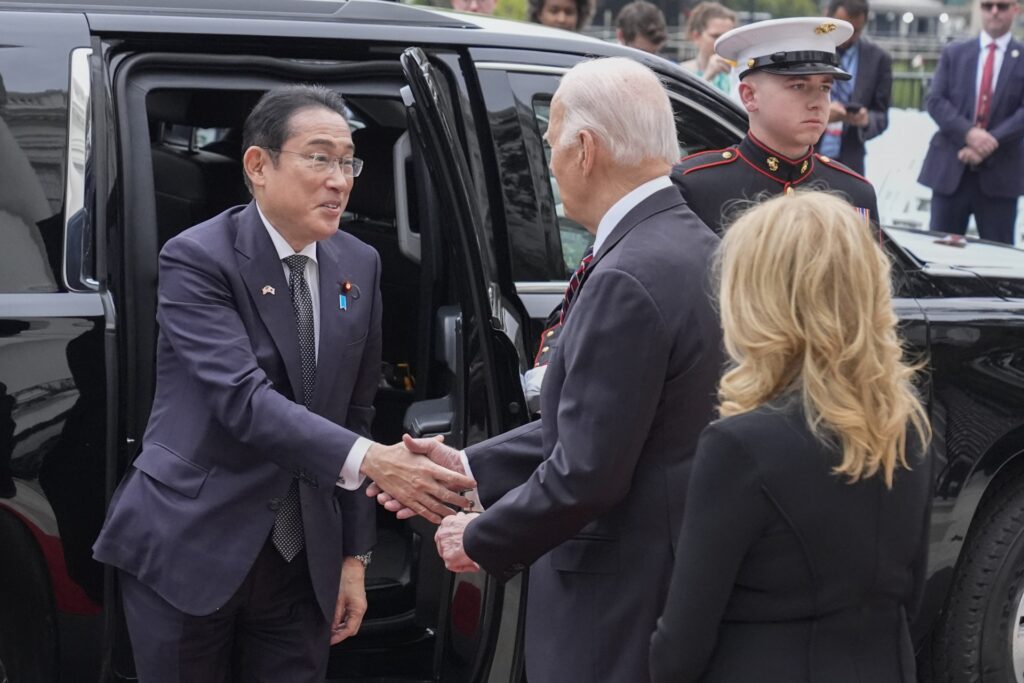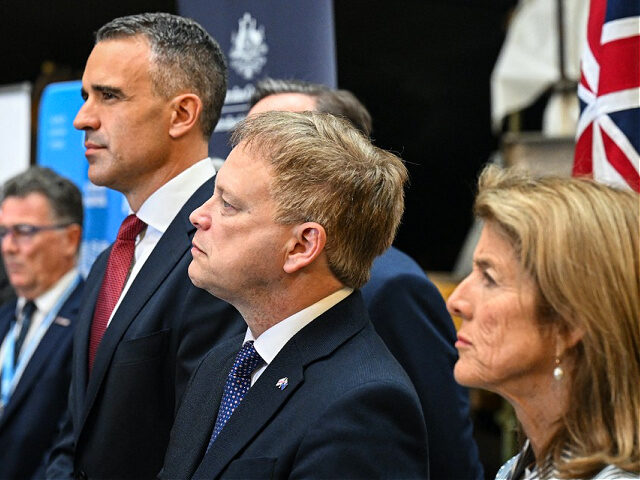The AUKUS military alliance, whose founding members are Australia, the United Kingdom, and the United States, is reportedly considering Japan as a fourth member.
The possibility was publicly discussed during Japanese Prime Minister Kishida Fumio’s visit to Washington this week and, according to one Australian source, the deal is all but done.
Australian Defense Magazine (ADM) said on Wednesday that Japan has been “cleared to join the AUKUS alliance,” and its official membership is so imminent that it could have been announced during Kishida’s visit to the White House on that day.
That did not happen, but the defense ministers of the three current members did mention on Tuesday they were “considering cooperation with Japan” on high-technology AUKUS products. UK Secretary of State for Defense Grant Shapps made it sound like the alliance might have collaboration, rather than full membership, in mind.
“Australia, the UK and U.S. are considering Japan’s potential involvement in some elements of the Pillar II program,” Shapps said.
The AUKUS alliance was divided into two “pillars” when it was established in 2021. Pillar I covers “conventional” weapons, primarily meaning submarines that do not carry nuclear weapons. Upgrading Australia’s submarine capabilities was a major early goal of the agreement.
Pillar II was titled “Advanced Capability Development” and covers electronic and cyber warfare, hypersonic missiles, artificial intelligence, and defenses against all of the above. Japan would undoubtedly be able to make valuable contributions to those endeavors.
The White House also mentioned “cooperation” with Japan on Pillar II projects on Wednesday, and Kishida praised America’s work with Japan on “the next generation of emerging technologies, such as AI, quantum, semiconductors, biotechnology and clean energy” in his address to the U.S. Congress on Thursday.

President Joe Biden and first lady Jill Biden greet Japanese Prime Minister Fumio Kishida upon his arrival at the White House on April 9, 2024, in Washington. (AP Photo/Alex Brandon)
None of these comments indicates a commitment to full membership for Japan in what would become a quadrilateral alliance. Adding Japan seems like a sensible idea from many angles, and it has excellent relations with all three of the existing members, but there could be some diplomatic trouble if the invitation is formally extended.
The obvious problem would be with China, which howled in outrage on the day AUKUS was announced and has never stopped howling since.
China constantly describes AUKUS as “dangerous” and unreasonable, especially since the alliance is working to improve Australia’s naval capabilities. The Chinese called AUKUS “dangerous” once again on Tuesday after senior U.S. diplomat Kurt Campbell mused that Australia’s new nuclear subs could help deter China from attacking Taiwan.
“The establishment of the so-called trilateral security partnership between the United States, Britain and Australia is essentially to provoke military confrontation in the region through military cooperation in small circles,” charged Chinese spokeswoman Zhu Fenglian.
On Monday, Chinese Foreign Ministry spokeswoman Mao Ning said her government is “gravely concerned” about reports Japan might join AUKUS.
“We oppose relevant countries cobbling together exclusive groupings and stoking bloc confrontation. Japan needs to earnestly draw lessons from history and stay prudent on military and security issues,” Mao said.
Another problem is that European countries might bristle if Japan is invited to join AUKUS before they are, especially France.
France was livid when Australia canceled a multi-billion-dollar submarine contract at the inception of AUKUS, transferring its business to the U.S. and UK instead. France actually recalled its ambassadors from Australia and the U.S. in protest, then insulted the British as mere “vassals” and lapdogs of the United States.
France would be a reasonable candidate for AUKUS membership, since it has a substantial naval presence in the Pacific thanks to territories like New Caledonia and French Polynesia, and it seems to have patched up its differences with the founding members of the trilateral alliance.
It is difficult to predict how the French would respond to Japan getting an invitation before they do. France has been thus far reluctant to join AUKUS in denouncing Chinese territorial aggression.
A similar concern exists with India, which shares AUKUS concerns about China and is obviously a key power in the Indo-Pacific region.
India already belongs to a group called the Quadrilateral Security Dialogue, commonly known as “the Quad,” whose other three members are the U.S., Australia, and Japan. It might seem odd if everyone in the Quad except India gets invited into AUKUS as well.
India might already be on the same path to membership or collaboration as Japan. Rumors swirled in March 2023 that AUKUS approached India about working on Pillar II projects and possibly joining the alliance in some capacity. Since that time, India has provided some convincing demonstrations of its naval power during the Red Sea shipping crisis.

COMMENTS
Please let us know if you're having issues with commenting.